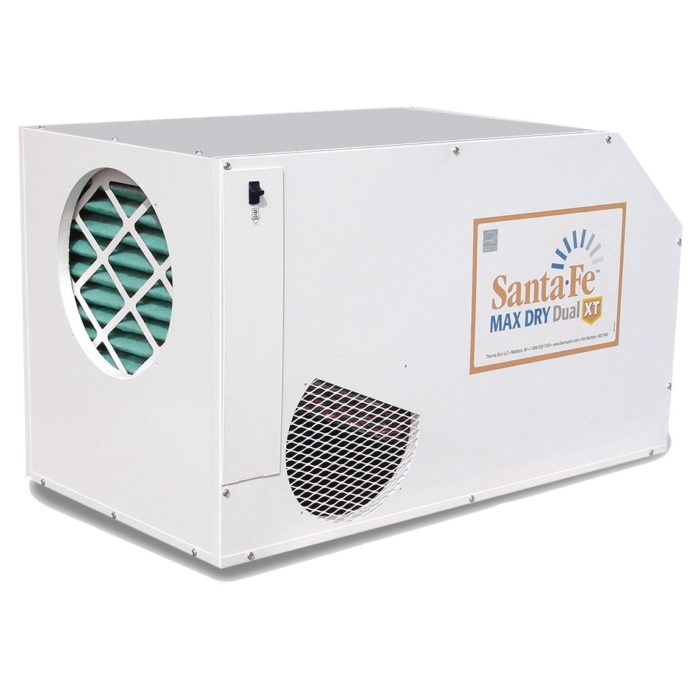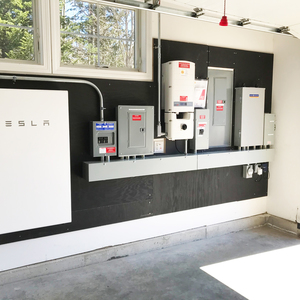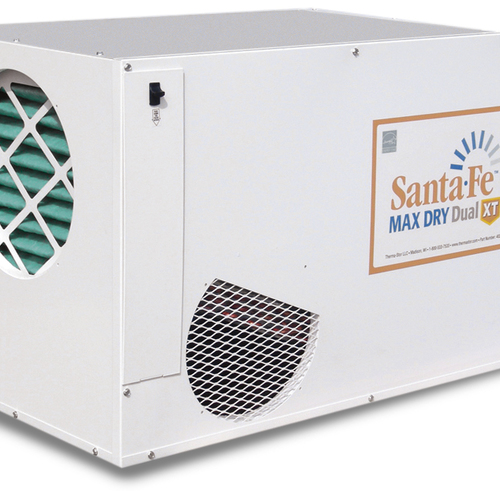
Image Credit: Therma-Stor
Superinsulation is the most effective weapon we have against wintertime heat losses. R-values of 60 or more in the roof and 40 in exterior walls can slow the movement of heat to a crawl, keeping energy costs far below what they’d be in a conventionally built house.
Yet Harry Seidel puts his finger on a potential problem. During the summer, any heat generated inside the house will have just as much trouble getting out of the house.
In a Q&A post at GreenBuildingAdvisor, Seidel wonders about the impact of running a Therma-Stor dehumidifier in a basement utility room of a superinsulated house in New Hampshire. The dehumidifier solves one problem but may create another.
“My question is in regard to the potential for the slab assembly in the house mentioned above to absorb and mitigate the heat generated?” he writes. “Given the sub-slab insulation [R-19], will this cause the basement to heat up? I could be wrong, but was told that 1 pint of water removed equates to 1,000 BTU of heat.”
“In N.H. and much of [New England] we have relatively high humidity in the summer months (trust me, it’s a problem) and a fresh-air delivery system (Renewaire ERV), although able to reduce moisture somewhat, achieves this by simply exchanging ambient exterior air for interior air,” he adds. “In our summers this will be useless and the house’s design is tight enough that moisture will prevail. It will build up and be a menace.”
Among the options he’s considering is the elimination of insulation below the utility-room slab to create a more effective heat sink for the dehumidifier.
Is there another approach that would be more effective? Or is Seidel anticipating more trouble than he’ll actually…
Weekly Newsletter
Get building science and energy efficiency advice, plus special offers, in your inbox.

This article is only available to GBA Prime Members
Sign up for a free trial and get instant access to this article as well as GBA’s complete library of premium articles and construction details.
Start Free TrialAlready a member? Log in













19 Comments
Vented portable AC?
I've been pretty happy with the vented portable AC unit I bought at Wall Mart.
It exhausts heat and humidity through a 4" dryer vent when it runs so I don't need to worry about water freezing in a drain hose or getting gravity drainage (the vent is about seven feet off the floor)
Damn units
Sorry, I was thinking in kWh and wrote BTU. I estimated 10,000 kWh/YR more heat loss through a uninsulated slab, which is about 34,000 kBTU/YR. Hope I didn`t cause to much confusion.... . Anyways at least the conclusion was right. Insulate Slabs!
You can't dry any basement or house with humid outdoor air
The whole notion that you can use ventilation with outdoor air to dry a New England basement is a bit wrong-headed, given that summertime dew point averages are north of 60F. Most healthy-air guides put an upper bound of 50% relative humidity (to keep dust mite reproduction under control) or 60% (to keep mold & fungus under control). ASHRAE specifies a 65% maximum (for comfort). Pulling 60F+ dew point air into a 70F basement raises the basement dew point to 70%+, and the mold risk skyrockets. Pulling 60F dew point air into a 75F first floor it's already at the 60%RH limit. It takes sub-55F dew point ventilation air to achieve 50% RH in a 75F room, or sub-51F dew point air to get 50%RH in a 70F basement.
The number of days/hours of sub-60% outdoor dew points between June15 & September 15 in southern New England are half at best, and sub-55F less than a quarter. Outdoor air infiltration is usually one of the largest SOURCES of indoor moisture in this region,usually exceeding the occupant-activity sources in typical, not-so air-tight houses. Keep the windows closed and running the AC + dehumidifier would generally result in lower energy use. To gain any drying advantage with outdoor air in New England requires watching the outdoor dew points like a hawk and scrambling to open & close windows often.
Response to Dana
Dana,
You're right. That's why Peter Yost wrote, "Don’t ERVs dehumidify in the summer? No."
Vented dehumidifier
@Michael Chandler - I had wondered about those. Is it efficient? I think I had understood that they must then boil the water out the vent...
Response to Martin
'Twas Peter Yost who also wrote:
"So if the basement air temperature sneaks up a bit, it won’t be long before we, and you, can be popping open all those windows, keeping your basement cool and dry au naturel."
...which is what prompted my post.
BTW: As I understand it smaller standalone dehumidifiers typically have an EF less than 1.5, whereas bigger ones can have an EF north of 2, approaching that of whole-house dehumidifiers (the higher efficiency due largely to the larger chilling coil). In a small to mid-sized fairly tight house where the occupants and their activities are the primary humidity source, it may be difficult to rationalize the price differential between whole house vs a larger standalone "room" dehumidifier. Most EnergyStar 65pint+ models will have a EF of 1.8 or better, whereas typical 30-35 pint models are under 1.2-1.4 (even with the Energy Star label.)
Daikin Quaternity isn't the only mini-split out there with a dehumidify mode, there are quite a few cooling-only minisplits that with dehumidify modes as well as a few heating & cooling mini-splits, but it may be the only one with true dehumidistat control. There is also at least one dehumidify-only mini-split targeted at the indoor-pool market (DryMAX).
You can't dry basement with humid outdoor air - Dana
Hi Dana -
You are absolutely right--just a question, I think, of what each of us means by how often and how long we keep our basement windows open and what interior RH we will tolerate in the basement.
I have not been keeping a record of our DEH run time this summer--which I had. I bet we run our DEH in the basement less than 25% of the time overall. And yes, we do open and close our basement hopper windows as a habit, just as we do on the first and second floor above grade floors. Has never seemed that big a deal. And also, we have found that the contents in our basement--including cardboard boxes and the like--will tolerate just about 65% RH but no higher before we start to get any real moisture or mold issues. So we close up the windows when it gets above 65% and then we set the humidistat on the DEH unit at about 65% (actually, the DEH unit just has a qualitative dial--I use a stand-alone hygrometer to gauge the setting on the DEH unit).
And thanks for the info on other equipment options for DEH - the smaller stand-alone DEH units, even Energy Star-rated, as you pointed out, are pretty lousy on efficiency, but we just don't seem to run ours enough at this point to justify an upgrade.
And note: we have stained concrete for our basement floor as the finished surface, except for a rug, which we roll-up and air out/UV treat (the sun) at least once a year. The carpet has absolutely no odor and we keep it well vacuumed (https://www.greenbuildingadvisor.com/blogs/dept/green-communities/carpet-basements-issues-solutions-and-alternatives).
The benefits of a tight house
It doesn't take much dehumidifier to keep the interior RH from drifting high even during the summer months as long as you're not over-ventilating. Most "whole house" versions are overkill for a tight house in a climate with only moderate latent loads. And the smaller the load, the less important the overall efficiency is.
Spending coupla grand for a whole house dehumidifier to double the efficiency over a 30-pint pipsquick to save $8.11/year isn't likely to be the best expenditure. For that kind of capital expenditure a smaller mini-split with a dehumidify mode that can also be used as high-efficiency auxilliary (or even primary shoulder-season) heating or cooling as well makes more sense.
Spending an extra $50 for a 70-pint unit that's 50% more efficient than the 30-pint version probably makes financial sense though, and could keep up with a pretty significant ventilation rates in New England weather.
Keeping the basement as high as 65% RH with a rug on an uninsulated slab can be pushing your luck a bit though, especially if your subsoil temps are in the 40s or lower, but even R3 of slab/floor insulation can make quite a bit of difference.
What about using a heatpump water heater
I not an expert but was wondering if using one of the new style water heaters that use a air source heat pump build into them to heat the water would help. The heat produced would go to heat the water not the house and it runs more when hot water is used in the house (like showers). While it runs it also dehumidifies. it would not run constantly but may help lower the need for a full time dehumidifier and you get lower cost heated water in return. Just a thought!
Mike, northern cellars, mine
Mike, northern cellars, mine at least are humid because they are cool in the summer. So a dehumidifier in a cellar does everything right. It warms the space and lowers the humidity. The heat pump water heater would work nice upstairs where it is warm and humid. But only for the months that we need cooling. Where I live I used to think I needed cooling but really prefer open windows and ceiling fans which lasts for four months or so. And screened sleeping porches are the best by the way.
basement humidity
We utilize a small fan in the basement, that vents out at ceiling level to the outside , with the intake in a connecting shaft at floor level. It lowers our humidity quite considerably.
Why use a dehumidifier rather than AC in the summer?
Friends of mine living in Wilmington, NC, asked me for advice regarding high humidity levels year round in their house. They want to save energy by keeping their thermostat turned up in the summer and down in the winter. However, because their AC isn't running enough, they are getting mold growth. They wonder about using a dehumidifier.
My question is this: In the summer time, when you want your house to be cool anyway, is there any benefit to running a dehumidifier rather than, or in addition to, an air conditioner? Especially if you already have central air and are running it to keep the temperature reasonable, wouldn't running a dehumidifier only increase the workload of your central air system by dumping more heat into your conditioned space?
I have a similar question about my basement. I run a dehumidifier all summer down there, but wouldn't I be better off just getting a window AC unit and using that to dump the heat and moisture outside? Are there AC units that come equipped with a humidistat, or would plugging it into a stand-alone humidistat work?
Response to Timothy Godshall
Timothy,
Q. "In the summer time, when you want your house to be cool anyway, is there any benefit to running a dehumidifier rather than, or in addition to, an air conditioner?"
A. In most cases, if you want to lower the indoor humidity during the summer, the first step is to close your windows and doors and turn on your air conditioner. If for some reason, your air conditioner fails to maintain your relative humidity target, you can supplement the air conditioning by running a stand-alone dehumidifier. For more information on this issue, see All About Dehumidifiers.
Q. "Especially if you already have central air and are running it to keep the temperature reasonable, wouldn't running a dehumidifier only increase the workload of your central air system by dumping more heat into your conditioned space?"
A. It's true that a dehumidifier adds heat to a house. But in some climate conditions, it is occasionally necessary to operate a dehumidifier along with the AC. The AC easily handles the extra heat produced by the dehumidifier.
Q. "I run a dehumidifier all summer down there [in my basement], but wouldn't I be better off just getting a window AC unit and using that to dump the heat and moisture outside?"
A. In the case of a basement, which is usually rather cool, I would stick with a dehumidifier. For more information on this topic, see Fixing a Wet Basement.
Q. "Are there AC units that come equipped with a humidistat?"
A. Kind of, sort of, but (for technical reasons) using an air conditioner to control humidity is complicated. I suggest that you purchase a dehumidifier with a humidistat control.
I have a southern question. Looks like these are all NE.
i have a super insulated house with a 1/2 basement in Texas. The basement was getting some mold so i installed a stand alone dehumidifier.
Like others have said, they generate heat. yes, this lowered my humidity but the basement heat went up.
for 4,200 sq feet we can keep our home cool with a 5 ton a/c unit.
i have the system set to a/c the upstairs but the basement set at circulate only. I do not a/c the basement, i circulate the air and pull the cool basement air to the upper floor.
The basement air may be drier with the dehumidifier but the circulated air down there is warmer with the dehumidifier running. it dumps the drain hose outside which exceeds the 70 pints the unit is rated at to eliminates in 24 hours, but it heats up the basement.
I am thinking to let the dehumidifier dump the water outside as it is but vent the hot air out the window. it lowers the basement humidity but lets mother earth cool the basement.
Do i lose anything be venting warm drier air outside but still pull the 70 pints per 24 hours from the house air?
>"Do i lose anything be venting warm drier air outside but still pull the 70 pints per 24 hours from the house air?"
Yes.
If you're blowing the hot air outside it has to be drawing outdoor in somewhere else in the house air in equal proportion to balance the indoor and outdoor pressures.
The heat that the dehumidifier "generates" is the latent heat of vaporization of the moisture that was removed from the air. It's unlikely that it removes more moisture from the air in one pass through the coil than is coming in from the outdoor air infiltration that it would drive if venting it outdoors.
One (probably partial) solution is to install a heat pump water heater in the basement, which takes that heat of vaporization out of the moisture in the air and delivers it as sensible heat to the water inside the insulated tank rather than sensible heat into the room air, which is what the room dehumidifier is doing. Both the humidity and temperature in the basement will go down when the water heater is running, whereas with the dehumidifier the basement air temp goes up as the humidity comes down.
The biggest source of basement humidity in hot humid climates is outdoor air infiltration. Doing a serious round of air sealing concentrating on the air leaks from the basement to the outdoors can probably put a sizable dent in the humidity problem.
> venting warm drier air outside
You certainly don't want to vent the air that you just paid to dehumidify outside. If you don't want the heat gain that a dehumidifier causes, then you should use an air conditioner (which will dehumidify and cool).
If the AC can handle all of the latent load (it may not), then running a dehumidifier in the basement is a waste of energy. Circulating the basement air upstairs is the right thing to do.
>"You certainly don't want to vent the air that you just paid to dehumidify outside."
That's absolutely right- something that I neglected to mention explicitly (thanks!)
Not only is the dehumidifier NOT actually dehumidifying the basement if vented to the outdoors, it's increasing the indoor humidity by driving outdoor air infiltration.
Our water heater is an on demand, tankless water heater. No energy is used while it is sitting dormant.
>"Our water heater is an on demand, tankless water heater. No energy is used while it is sitting dormant."
Yes, energy IS being used when the tankless water heater is dormant- just not directly for water heating.
To be more specific more energy is being used by the dehumidifier converting the latent heat (moisture) into sensible heat, AND the air conditioner that's removing the sensible heat (and a bit more latent heat) from the house.
A typical heat pump water heater uses about 1/3 the amount of electricity for heating water than an electric tankless, and in the process relieves much of the load from the dehumidifier. In a hot humid climate with basement humidity issues it's a total win year-round. (In cold climates it can add measurably to the space heating load numbers, but less than one might think.)
Log in or become a member to post a comment.
Sign up Log in